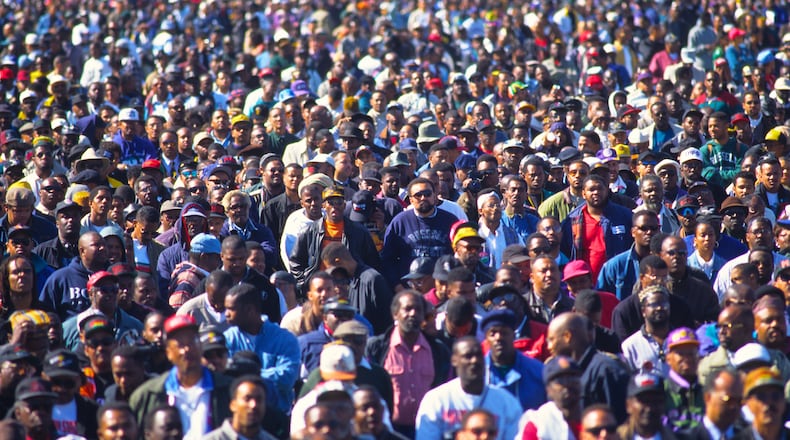At that time, I was in a month-long class at Fort Belvoir, Va. Several of my work friends from Dayton and prior college friends met and we attended the march together.
Other than it being absolutely non-violent, my two greatest takeaways from the march were the pledge that Farrakhan led the 800,000 to million Black men in and, secondly, the variety of excellent speakers. The non-violent march burst a major stereotype about Black men being violent.
I took the Million Man March pledge and have done everything in it except for directly engaging in international trade.
If you haven’t read the pledge, you should. It focused primarily on self-help and self-determination.
Recently, I shared the pledge with my daughters. They agreed everything in it was still relevant now. My response to them was that the one item not addressed in it was technology.
Who could have projected 25 years ago the effect of Technology on our society such as social media, biotechnology, robotics, and artificial intelligence?
The Million Man March pledge addressed love for self and one another. It focused on building us up for the benefit of our communities.
The pledge focused on community institution building, while practicing non-violence toward self and others, except for self-defense.
We are to avoid abusing spouses, children and others physically and verbally; and we are to create an environment where our children and significant others can grow to their potential.
We are to support our Black owned businesses and other institutions, as well as our artists that respect the human family, while avoiding addictive drugs.
The speakers beyond Farrakhan and Chavis were motivational. They included then Washington D.C. Mayor Marion Berry, Betty Shabazz, Rosa Parks, Dorothy Heights, Maya Angelou, Cornell West,
Rev. Joseph Lowery, Dr. Niam Akbar, Rev. Frederick Haynes, III, and Martin Luther King, III.
In 1995, I felt a sense of collective pride and ownership among Black Americans. Now, I sense that there is more divisiveness in the Black community partly due to a generational gap abetted by social media. Black Lives Matter, which I refer to as Black Lives Matter Too, is necessary due to brutality.
Credit: Shutterstock
Credit: Shutterstock
We are truly at an inflection point in our society and worse off in the areas of politics, religion, race relations, and economics.
Restorative public policy is a must to ensure Black men and their communities achieve true equality and a level playing field going forward.
I PLEDGE that from this day forward I will strive to love my brother as I love myself. I, from this day forward, will strive to improve myself spiritually, morally, mentally, socially, politically and economically for the benefit of myself, my family and my people. I pledge that I will strive to build businesses, build houses, build hospitals, build factories and enter into international trade for the good of myself, my family and my people.
I PLEDGE that from this day forward I will never raise my hand with a knife or a gun to beat, cut, or shoot any member of my family or any human being except in self-defense. I pledge from this day forward I will never abuse my wife by striking her, disrespecting her, for she is the mother of my children and the producer of my future. I pledge that from this day forward I will never engage in the abuse of children, little boys or little girls for sexual gratification. For I will let them grow in peace to be strong men and women for the future of our people.
I WILL never again use the ‘B word' to describe any female. But particularly my own Black sister. I pledge from this day forward that I will not poison my body with drugs or that which is destructive to my health and my well-being. I pledge from this day forward I will support Black newspapers, Black radio, Black television. I will support Black artists who clean up their acts to show respect for themselves and respect for their people and respect for the ears of the human family. I will do all of this so help me God.
Huber Heights resident Edmund H. Moore holds PhD in material science and engineering. The U.S. Air Force as an engineer is the author of “With a Father’s Love: 52 Weekly Letters to My Beloved Daughters.”
Guest columns are submitted or requested fact-based opinion pieces of 300 to 450 words. Have an idea for a column? Contact Community Impact Editor Amelia Robinson at arobinson@daytondailynews.com.
About the Author


